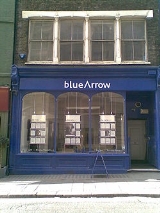
Re Blue Arrow plc
Encyclopedia
Re Blue Arrow plc [1987] BCLC 585 is a UK company law case dealing with unfair prejudice under s 459 Companies Act 1985
(now s 994 Companies Act 2006
).
of "Sheila Birch". Then she met Mr Berry. They were impressed by each others' business talents and decided to set up a new company. She transferred her business and shareholdings to the new firm, Blue Arrow
, in which she took a 45% stake. Mr Berry took a 55% stake. Blue Arrow had a variety of subsidiaries. Mrs Watson-Challis was the executive director of the subsidiaries and the "president" of the parent, while Mr Berry was the chairman. By 1984, Mrs Watson-Challis was travelling overseas, and no longer taking an active part of the company's affairs. The company was floated, it went public. Over time, with many others buying up new share offerings, her percentage of the shareholding went down to 2.1%. She resigned her directorships, but her position as "president" remained written into the company's constitution, the articles of association
. Then she decided she wanted to come back. The management resisted, and they resolved to alter the company's articles so that she could be removed from her position as president. She petitioned the court that such action was "unfairly prejudicial" because she had a legitimate expectation to participate in the company's affairs.
Companies Act 1985
The Companies Act 1985 is an Act of the Parliament of the United Kingdom of Great Britain and Northern Ireland, enacted in 1985, which enabled companies to be formed by registration, and set out the responsibilities of companies, their directors and secretaries.The Act was a consolidation of...
(now s 994 Companies Act 2006
Companies Act 2006
The Companies Act 2006 is an Act of the Parliament of the United Kingdom which forms the primary source of UK company law. It had the distinction of being the longest in British Parliamentary history: with 1,300 sections and covering nearly 700 pages, and containing 16 schedules but it has since...
).
Facts
Mrs Watson-Challis was in the recruitment agency business. Between 1956 and 1982 she had built up a variety of businesses. In business she went by the pseudonymPseudonym
A pseudonym is a name that a person assumes for a particular purpose and that differs from his or her original orthonym...
of "Sheila Birch". Then she met Mr Berry. They were impressed by each others' business talents and decided to set up a new company. She transferred her business and shareholdings to the new firm, Blue Arrow
Blue Arrow
Blue Arrow Limited is a United Kingdom based employment and recruitment agency that places individual jobseekers in employment and provides businesses with temporary and/or permanent staff in the industrial sector, catering sector, driving sector, logistics sector and office sector.The head office...
, in which she took a 45% stake. Mr Berry took a 55% stake. Blue Arrow had a variety of subsidiaries. Mrs Watson-Challis was the executive director of the subsidiaries and the "president" of the parent, while Mr Berry was the chairman. By 1984, Mrs Watson-Challis was travelling overseas, and no longer taking an active part of the company's affairs. The company was floated, it went public. Over time, with many others buying up new share offerings, her percentage of the shareholding went down to 2.1%. She resigned her directorships, but her position as "president" remained written into the company's constitution, the articles of association
Articles of Association
The Continental Association, often known simply as the "Association", was a system created by the First Continental Congress in 1774 for implementing a trade boycott with Great Britain...
. Then she decided she wanted to come back. The management resisted, and they resolved to alter the company's articles so that she could be removed from her position as president. She petitioned the court that such action was "unfairly prejudicial" because she had a legitimate expectation to participate in the company's affairs.

